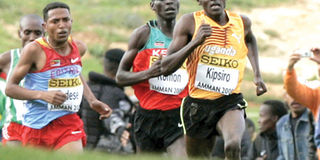Officials earn 5 times more than Olympians

Uganda’s long distance star Moses Kipsiro (R) enroute to winning a silver medal at the 2009 World Cross Country Championships in Amman, Jordan. COURTESY PHOTO
What you need to know:
Shame of Olympics funding. Investigation reveals that government money meant for preparations never materialised. Now most of it will be spent on officials instead of our athletes.
The government did not provide money for Ugandan athletes to fund their preparations ahead of the 2012 Olympics that start tomorrow in London, a senior official has said.
Investigations by this newspaper also reveal that Uganda is sending more officials than athletes to the games and will pay some officials five times more allowances than the medal hopefuls.
William Blick, the president of the UOC, told this newspaper yesterday that preparations that ought to have started more than six months ago had been hamstrung by the lack of money and infighting in the organisation, which kept potential sponsors away.
Although the government offered Shs400 million to the Ugandan team, Mr Blick said part of the money was delivered in kind and some had not been delivered by yesterday, hindering training and preparations.
“I am not happy with government money,” he said. “I appreciate it but it comes late. We did not get money for preparations. It is not what I would have wanted but it’s beyond my control.”
Official records from the Uganda Olympic Committee (UOC) show that Uganda will send 16 athletes and 18 officials to the games.
The body in charge of the Paralympics, which start after the main games, is sending two athletes and four officials.
These figures do not include several other officials whose participation in the games will be funded by the government.
For instance Vice President Edward Ssekandi, who is part of the 18 UOC officials, and is head of the Ugandan delegation, is expected to travel to London with an entourage of at least three other officials, paid for by the government.
The list does not also include officials from the National Council of Sports who are also expected to pay for their trip to London out of public funds.
Investigations by this newspaper also reveal that some team officials will be paid five times more than the athletes who will carry the country’s hopes and pride.
Athletes, coaches and other technical officials will each receive $72 per day for 15 days as out-of-pocket expenses, paid out of government’s contribution to the team.
However, at least five officials on the Olympic committee will each receive $350 per day for the 15 days. Blick, UOC secretary general Peninnah Kabenge, and the politicians on the team are also entitled to taking along a guest of their choice to the games, paid for by the International Olympic Committee, and government respectively.
According to public service guidelines, the VP is entitled to a rate of about $710 per day while the minister’s per diem is understood to be at least $540.
Although some of the officials also have paid-for accommodation, they are expected to receive the full rate, sources said.
The athlete’s rate is about 20 per cent of the $350 government rate because they have accommodation and meals in the Olympic Village.
Mr Blick, who is one of the officials entitled to the higher per diem, defended the decision to pay officials more than athletes.
“Personally I think officials should be getting more money,” he told Daily Monitor. “We had asked for more money but that is all we were given and are now trying to get a top-up.”
The official further defended the decision by revealing that athletes had been offered an incentive of $10,000, $5,000 and $2,500 for each gold, silver and bronze medals won at the games.
Team Uganda’s preparations for the games have been marred by controversy and a power fight in the UOC.
Although the country is sending its largest contingent of athletes since the Los Angeles games in 1984, few of the athletes are seen as genuine medal hopefuls due to a lack of investment in training and preparation programmes.
Uganda’s ratio of officials to athletes is comparable to some countries like Kenya, which is sending 52 athletes and about 60 officials, excluding ministry and government entourage.
However, many of Kenya’s athletes are genuine medal hopefuls and justify the higher number of officials the country sends to the games, compared to Uganda.
Uganda’s participation at the 2010 Commonwealth Games in Delhi, India, were marred by allegations of officials carrying relatives and close associates instead of investing in the team’s preparations before and during the games.




